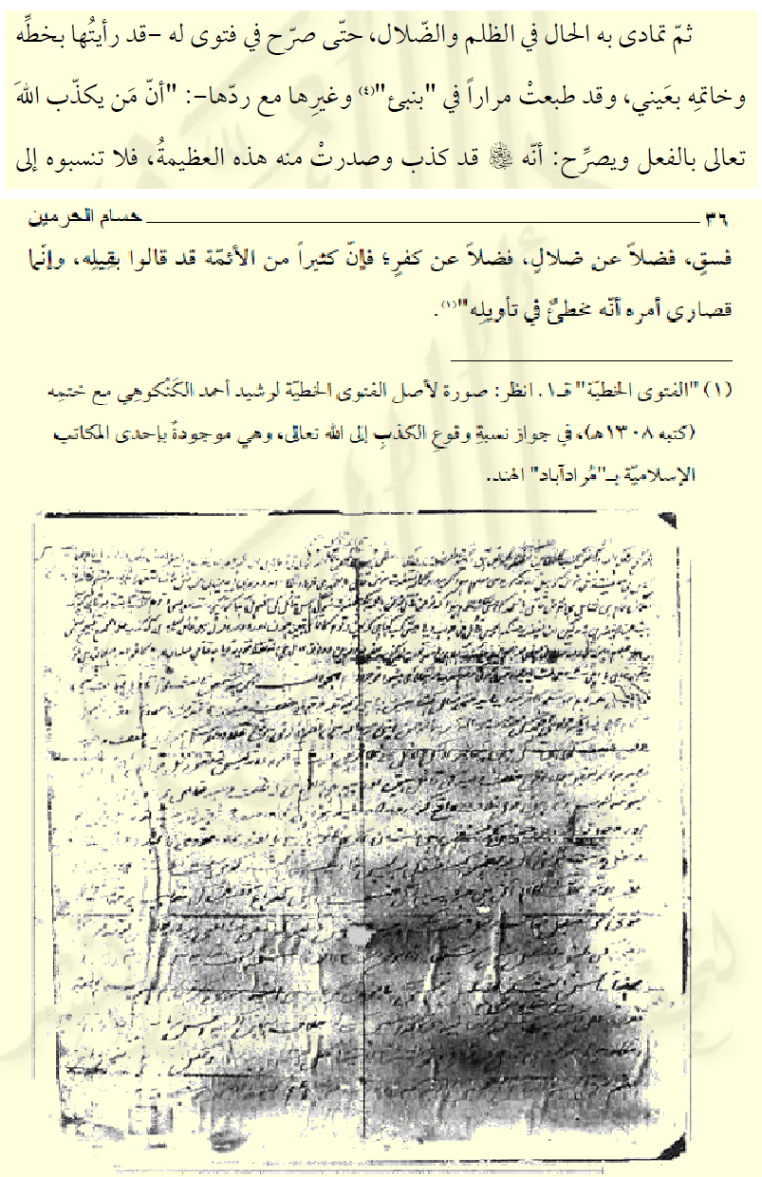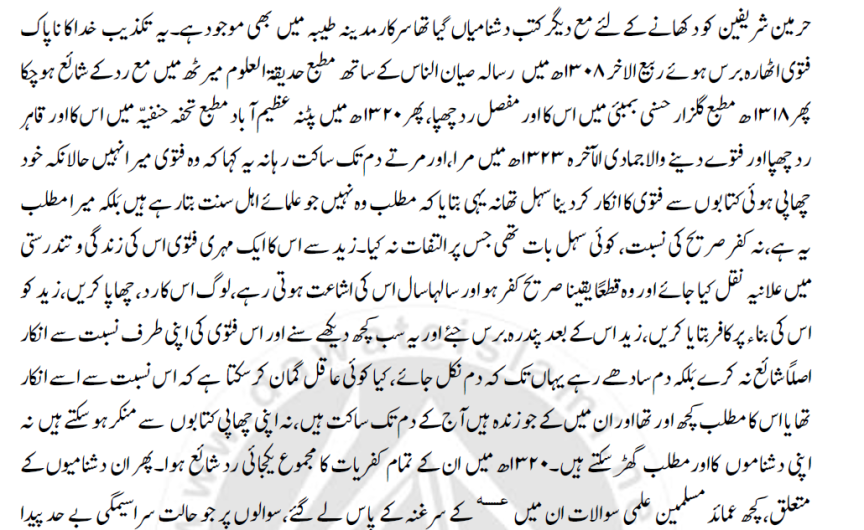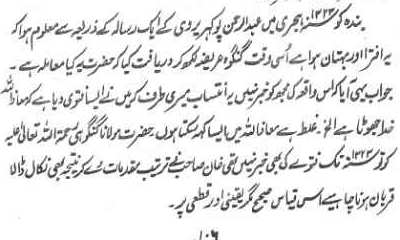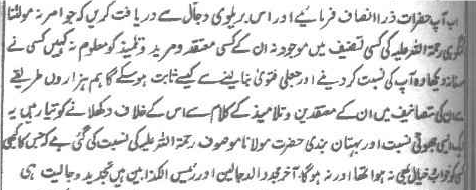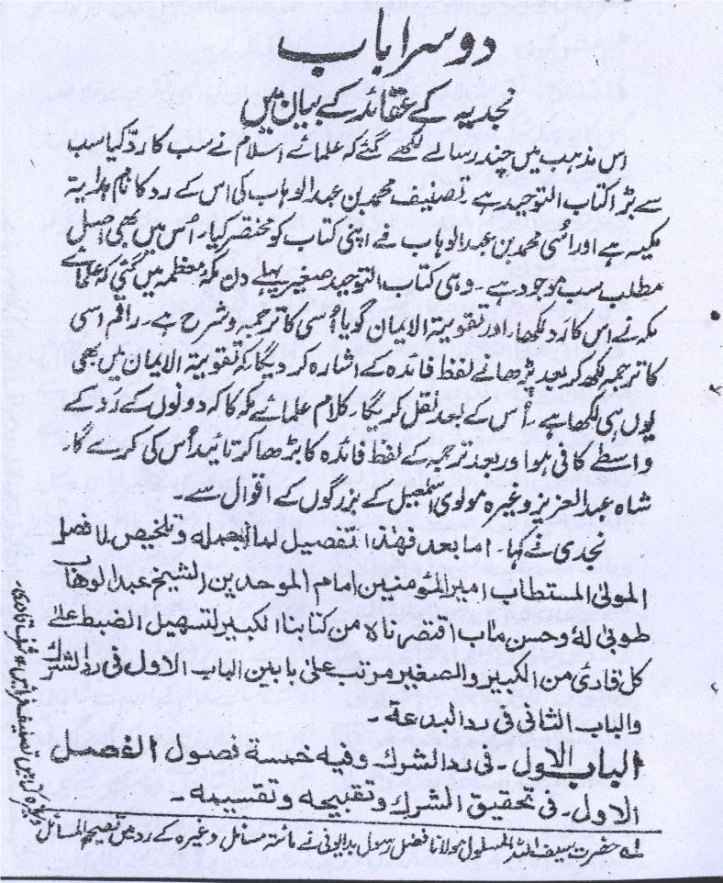The Philosophy of Jihād in Islāmic Law
& Responding to Modernist Distortions
Mufti Muhammad Taqi Usmani
The Meaning of Jihād“Jihād” is derived from the root letters
j-h-d. Al-Qasṭallāni said in
Irshād al-Sārī (5:31):
Ibn Manẓūr said in
Lisān al-‘Arab (3:135):
As for its meaning in the terminology of Sharī‘ah, the ‘Ulamā’ have defined it using different expressions, most of which refer back to the same meaning. Al-Qasṭallānī said in
Irshād al-Sārī (5:31):
Al-Kāsānī said in
Badā’i‘ al-Ṣanā’i‘ (7:97):
If we wish to condense these expressions, we can say: Jihād is not limited to the immediate act of killing. Rather, it is every effort that is expended in the path of elevating Allāh’s Word and breaking the supremacy of disbelief and the disbelievers, whether with a weapon, with wealth, work, writing or speech. However, when the word “Jihād” is used unconditionally, the effort expended in fighting the disbelievers is normally meant. It is not used unconditionally for something else without an indication that points to it.
Similarly, sometimes this word is used unconditionally for struggling with the inner self, as has occurred in ḥadīth: “The Mujāhid is the one who struggles with his inner self for the obedience of Allāh. The Muhājir is the one who flees from what Allāh forbade.” Aḥmad recorded it, as did al-Ḥākim, who graded it authentic and al-Dhahabī concurred. However, this usage is a metaphorical usage in relation to its known technical meaning, so is not considered without qualification.
Aims and Goals of JihādThe ‘Ulamā’ have listed many localised aims and goals of Jihād, to which we can add other localised aims in accordance with the situation and circumstance. However, the foundational goal in legislating Jihād, as indicated by the texts of Sharī‘ah, is: strengthening Islām and elevating Allāh’s Word and destroying the supremacy of disbelief.
In the last century, Jews and Christians from amongst the Westerners have stirred up a ruckus in opposition to the laws of Jihād. They claimed that Jihād is a means of coercing people into accepting Islām. They claimed that Muslims spread their religion with sword and weapon, not with proof and argument, hence they attacked the lands of the disbelievers and coerced them at the tip of the sword to accept their religion, and the only call they made to Islām was by fighting and with the sword. This is all ignorance or feigning ignorance about the reality of Jihād in Sharī‘ah and its relationship with the call (
da‘wah) to Islām.
The reality is that Jihād was not legislated to coerce people into accepting Islām. Rather, it was legislated only to establish Allāh’s rule in the land and to destroy the supremacy of disbelief and disbelievers which, throughout history, was the greatest cause for the spread of oppression, strife and corruption, and the greatest impediment to accepting the truth and listening to the call of Islām.
If the goal of Jihād was to force people to accept the religion, the Jizyah tax would not have been legislated to bring an end to war. Indeed, the legality of the Jizyah tax is one of the clearest proofs that Jihād is not for coercing people to accept the religion. It was not recorded in any of the wars of Jihād – despite their great frequency in the course of history – that any of the disbelievers was forced to accept Islām after the Muslims conquered a place. Rather, the disbelievers were left fully at ease with their religion. Then, the Islāmic call came, accompanied by proof and argument, and by noble lives, and beautiful characters, and charismatic works, so the disbelievers rushed to Islām after they were convinced of its truth, and certain of the beauty of its teachings, without anybody compelling them to do this. Jihād was legislated only for the elevation of Allāh’s Word on Allāh’s land, and for it to have glory and strength, and to destroy the supremacy of the tyrants who enslave Allāh’s slaves to their rules and their laws that derive from their minds, and refuse Allāh’s rule being established in His land, and they spread every oppression, evil and corruption using the strength of their dominion.
However, a group subscribing to Islām, impassioned by Western thought, infatuated by its principles and ideas, and always defeated by its objections that know no end, instead of understanding the reality of Jihād and that disbelievers will never be pleased with it, began making excuses to them using defeatist and fatuous excuses. As a result, they began distorting the texts, saying: “Jihād was not legislated except for defending the homeland of Islām against an enemy attack and it is not permissible to initiate an attack against a disbelieving nation that is not attacking the Islāmic lands.”
This is indeed an innovated opinion, with no basis in the Book and Sunnah, and no precedent in the history of Jihād, and no support in Islāmic Fiqh in the course of fourteen centuries. However, many people in our time have become deceived by it, so we wish to refute it in some detail. Allāh (Glorified is He) is sought for help.
Stages in the Legislation of JihādIn order to understand the reality of Jihād and its rulings mentioned in the Book and Sunnah, it is necessary to recognise that Jihād, from the beginning of Islām, underwent several stages in its legislation & did not reach its final ruling except after some time; namely, four stages:
1. The first stage was: enduring the persecution of the idolaters while continuing to preach the religion of truth. The Prophet ﷺ and his companions were forbidden from fighting. This was the first stage in the call to Islām. These rules were repeated in the Noble Qur’ān during the period of his ﷺ stay in Makkah. Thus, He (Exalted is He) said:
and:
Allāh’s Messenger ﷺ said to his companions during this period:
The ḥadīth was transmitted by al-Nasa’ī, al-Bayhaqī (9:11), al-Ḥākim in
al-Mustadrak (2:307) who said it meets the criterion of al-Bukhārī and al-Dhahabī made no comment on it.
Imam al-Qurṭubī said in his
Tafsīr (3:38):
2. The second stage is permission to fight, without it being made obligatory on the Muslims. Regarding this stage, His (Exalted is He) statement was revealed in Sūrah al-Ḥajj:
Ibn Kathīr said in commenting on this verse:
3. The third stage is the obligation on the Muslims to fight only those who initiate fighting, without initiating it against their enemies. Regarding this stage, His (Exalted is He) statement in Sūrah al-Baqarah: 190 was revealed:
and His (Exalted is He) statement in Sūrah al-Nisā’: 90-1:
4. The fourth stage is to initiate fighting against all disbelievers with their differences in religion and race, even if they do not initiate fighting with the Muslims, until they become Muslims or pay the Jizyah, in order to break the supremacy of disbelief and strengthen the religion and elevate Allāh’s Word. This stage began after the passage of four months after the Ḥajj in the ninth year of Hijrah, which was led by Abū Bakr al-Ṣiddīq (Allāh be pleased with him). The declaration of this stage occurred in this Ḥajj upon the tongue of ‘Alī ibn Abi Ṭālib (Allāh be pleased with him). Allāh (Glorified his He) mentioned this in detail in Sūrah al-Tawbah. He (Exalted is He) said therein:
In the same sūrah, He (Exalted is He) says:
He says in Sūrah al-Anfāl: 39:
Many of the ‘Ulamā’ from the predecessors mentioned these stages in the legislation of Jihād. We will cite some of these statements in the following:
Imam al-Shafi‘i said:
Shams al-A’immah al-Sarakhsī said in
al-Mabsūṭ (10:2):
Ibn Taymiyyah (Allāh have mercy on him) says in his book
al-Jawāb al-Ṣaḥīḥ liman Baddala Din al-Masīḥ (1:74):
Ibn Rushd said the same in
Bidāyat al-Mujtahid (1:371, 372) and Ibn al-Qayyim in
Zād al-Ma‘ād (3:160), as did other ‘Ulamā’ from the predecessors.
Are the First Stages Abrogated (Mansūkhah) or in Force (Muḥkam)?
The expressions of the ‘Ulamā’ differed in explaining the reality of these stages. Some of them claimed that every new stage abrogated the ruling that preceded it, so the first three stages are abrogated today, and the only one remaining today is the final stage i.e. the fourth stage. Others disagreed with them, and said: the first stages are not abrogated but are linked to specific conditions, and whenever they return, their rulings return. The foremost of those who said this is ‘Allāmah Badr al-Din al-Zarkashī (Allāh have mercy on him). He said there is no abrogation in the stages of Jihād. Rather, every stage is to be implemented in a situation that resembles the situation in which it was legislated.
Al-Zarkashī (Allāh have mercy on him) said in his book
al-Burhān fī ‘Ulūm al-Qur’ān (2:41-2):
The reality is that this disagreement does not stem from disagreement in practice. It is only a difference in phrasing. Everyone says these rules are conditional on specific conditions. Thus, the rules of patience and forgiveness will be in effect (
muḥkamah) in the state of weakness and incapacity. Permission to fight will be in effect in a circumstance above the first. The obligation to fight to defend will be in effect in a circumstance above this. The obligation to initiate war will be in effect when the Muslims have attained power whereby they can do that. The first group calls this a type of abrogation. Al-Zarkashī (Allāh have mercy on him) called it postponement and did not like calling it abrogation.
The Difference between Defensive Jihād (Jihād al-Daf‘) and Offensive Jihād (Jihād al-Ibtidā’) in Terms of RulingOnce it is established that both the categories of defensive Jihād and offensive Jihād are legislated and in force, it should be known that they differ in their legal ruling. Defensive Jihād is an individual obligation (
farḍ ‘ayn) when the enemy attacks the frontiers of Muslim land, whereas offensive Jihād is a communal obligation (
farḍ kifāyah) in the most correct of the two views.
As for defensive Jihād, Imam al-Jaṣṣāṣ says in
Aḥkam al-Qur’ān (3:114):
As for offensive Jihād, the majority say that it is a communal obligation provided there is capability to do so. When some Muslims execute it, the obligation drops from the rest (of the Ummah), unless they do so voluntarily. It was narrated from some of the Ṣaḥābah and Tābi‘īn that they believed this to be an individual obligation, as mentioned in
Fatḥ al-Bārī (6:38) and
Tafsīr ibn Kathīr (4:97).
Ḥāfiẓ (Ibn Ḥajar) says in
Bāb Wujūb al-Nafīr in
Fatḥ al-Bārī (6:37-8):
The Aim of Offensive JihādOnce this has been established, it should be understood that offensive Jihād is not to compel people to accept the creed of Islām. Rather, it is a struggle to establish Allāh’s rule in His land. Islām does not only consist of beliefs and worship, as with other religions, but it is Allāh’s rule in all affairs of life. Its call is a transformative call, not only in beliefs, but also in the establishment of justice in the land which Allāh has legislated upon His servants. One of its goals is clearing the world of oppression, injustice and corruption, and establishing justice in the land by making Allāh’s Sharī‘ah the law.
The most that Islām tolerates from the disbelievers is that they remain on their belief if they insist on it. However, it will never be pleased with them enslaving the slaves of Allāh by enforcing their laws that proceed from their minds and corrupt desires, which makes oppression and injustice permissible, or spreads licentiousness and immorality, or corrupts the natures of people and blocks their ears from accepting truth and guidance. Thus, Islām made the goal of offensive Jihād one of two matters: either to convert the disbelieving lands to Islām or to impose the Jizyah, at which they will be left to their belief, but they will not be left to enforce their laws in the land over Allāh’s servants. The land will follow Allāh’s rule and the rules of Islām and then the disbelievers will be left with what they profess as their religion in their personal life, and they will pay the Jizyah –a small amount of wealth – because the Islāmic government protects their lives, properties and reputations.
Indeed this goal is what Allāh (Glorified and Exalted is He) clarified in His (Mighty and High is He) statement:
Imam Ibn Jarīr al-Ṭabarī says in the commentary of this verse (13:547):
This goal is what Rib‘ī ibn ‘Āmir exclaimed in front of Rustum when the Muslims attacked Iran and Rustum asked:
He replied:
Ibn Kathir cited it in
al-Bidāyah wa l-Nihāyah (7:39).
If the disbelievers accept the establishment of Allāh’s rule over people, and surrender to it by paying the Jizyah, the objective of Jihād would have been attained. They will not then be compelled to accept the creed of Islām at the tip of sword and weapon. Rather, they will be left to their belief until they are certain about the truth of Islām and want to, of their own accord, embrace it with open eyes. Allāh (Glorified and High is He) alludes to this when He says:
The Proofs of Those Who Limit Jihād to Defence Only and its RefutationAll of what we mentioned about the reality of Jihād, its rules and its goals, is derived from the Qur’ān, the Sunnah and the statements of the pious predecessors. This is what the Muslims have continued to believe about the matter of Jihād and have implemented for the course of thirteen centuries of their history. The legality of Jihād along with its types became a point of agreement. No two disagreed about it and two opinions about it did not emerge.
However, in the fourteenth century, men emerged who wanted to apply Islām by Western theories and ideas. They attempted to innovate opinions in Islāmic jurisprudence in many issues that agree with the desires of the Westerners, and force-feed them into the mouth of the texts (of Qur’ān and Sunnah) to please the Colonialists and Orientalists, while being oblivious of Allāh’s statement (Glorified and High is He):
So these people produced an innovation which has no precedent in the matter of Jihād, namely that Jihād in Islām is defensive only, and Muslims are not permitted to fight the disbelievers in order to subjugate them to the authority of Islām and to elevate Allāh’s Word over their word, unless the disbelievers begin hostilities against Muslims. The first time this innovated view emerged, as far as we know, is at the hands of the students of the modernist rationalist school, the most famous of whose members are Muftī Muḥammad ‘Abduh, Rashīd Riḍā and Jamāl al-Dīn al-Afghāni from the Arab lands, and Sir Sayyid Aḥmad Khān and Chirāgh ‘Alī and their likes from India. Ustādh Shiblī Nu‘māni, author of
Sīrat al-Nabī, also followed their example in this matter. Many contemporary authors in the Islāmic lands have been influenced by this view. But at the same time, excellent ‘Ulamā’ arose in every land and region to refute this theory with convincing proofs and clear evidences, there being no scope to deny them.
From the greatest of what they use to support this innovated opinion are the verses which permit the Muslims to make peace and enact a truce, or commands them to engage in Jihād when the disbelievers transgress, although we have explained about the history of the legislation of Jihād that these are verses from a particular period that teach the legality of Jihād in a particular circumstance and do not negate its legality in another circumstance.
So, for example, they argue from His (Exalted is He) statement:
although as we have mentioned previously these verses only teach the legality of the third stage at the beginning of Islām when the Islāmic nation was in a state of weakness, so Allāh made it obligatory on them to fight those who fight them, not those who do not initiate fighting. This was said by Imām al-Shāfi‘ī in the passage we quoted from his
Aḥkām al-Qur’ān.
Some exegetes say it was revealed about women and children and it means:
This is a strong exegesis supported by the Prophet’s ﷺ prohibition of killing women and children and people in monasteries. See
Aḥkām al-Qur’ān by al-Jaṣṣāṣ (1:257).
As for His (Exalted is He) statement,
“transgression” (
i‘tidā’) here means, as the exegetes have said, to not fight for other than religion and to only fight those capable of combat, that is adult men, not women, children and monks, for this is indeed transgression. See
Aḥkām al-Qur’ān by Ibn al-‘Arabī (1:104, 105).
Sometimes they argue from His (Exalted is He) statement:
even though it too is in the context of clarifying the ruling in the state of the Muslims being weak. Ibn al-‘Arabī (Allāh have mercy on him) says in
Aḥkām al-Qur’ān (4:864):
Imam Abū Bakr al-Jaṣṣāṣ said in
Aḥkām al-Qur’ān (3:70):
There is another group of exegetes who interpret “peace” in the verse (8:61) as mutual agreement for the disbelievers to pay Jizyah. Al-Qurṭubī (Allāh have mercy on him) says:
They may argue from His (Exalted is He) statement:
although this verse too is of a particular period and was revealed about a specific group. Some exegetes said it is abrogated by the verse of al-Barā’ah:
This was narrated from Ibn ‘Abbās (Allāh be pleased with him) as found in
Tafsīr ibn Kathīr (1:533) and
Rūḥ al-Ma‘ānī (5:111). Some said it is still in force with regard to individuals from the army of the disbelievers who avoided fighting. Ibn Kathīr said:
In sum, all the verses which they argue from pertain to circumstances specific to the beginning of Islām. Jihād eventually settled on what was revealed in Sūrah al-Tawbah in His (Exalted is He) statement:
and His (Exalted is He) statement:
and His (Exalted is He) statement:
All of these verses tell the Muslims to initiate fighting with the disbelievers. No mention is made of the reason to fight except their disbelief in Allāh and the Last Day and not forbidding what Allāh forbade and so on. They do not say that the reason for fighting them is their attacks against Muslims. These verses are from the last of what was revealed of the Noble Qur’ān. Thus, they are in force, and the rule remains till the coming of the Hour. Acting on these decisive verses, Allāh’s Messenger ﷺ said:
This is the wording Muslim transmitted from Abū Hurayrah in
Kitāb al-Īmān,
Bāb al-Amr bi Qitāl al-Nās ḥattā Yaqūlū Lā Ilāha Illa Llāh. This is a clear unequivocal text on the legality of offensive Jihād, which cannot be understood as defensive Jihād only.
This is a summary of what we wanted to present on this issue. A number of ‘Ulamā’ have written independent books on this, and whoever wants more detail should refer to them. From the best of what was written on this subject are two books:
First,
Ahammiyat al-Jihād fi Nashr al-Da‘wat al-Islāmiyyah by Dr ‘Ali ibn Nufay‘ al-‘Alyānī.
Second,
al-Sharī‘at al-Islāmiyyah wa ‘l-Qānūn al-Duwalī al-‘Āmm by Dr ‘Abd al-Karīm Zaydān. This article of his has been published in his book
Majmū‘ah Buḥūth Fiqhiyyah.
I benefited much from these books when writing this piece. Allāh (Exalted is He) reward them greatly.
This much is sufficient for students of knowledge if Allāh (Exalted is He) wills.
Takmilah Fatḥ al-Mulhim, Dār Iḥyā’ al-Turāth al-‘Arabī ed., vol 3 pp. 5-15; Dar al-Qalam ed., 3:5-12
AddendumThe following are some excerpts from a letter of Mufti Taqi Usmani written in 1971 in response to a questioner who claimed that Jihad is only for the purpose of facilitating missionary activity, and if missionary activity is lawful in non-Muslim lands, Jihad is no longer applicable:
“There are no legal restrictions in most countries today on preaching Islam, but since their grandeur and authority is established in the world, it has led to developing a universal feeling [of their superiority] which forms a greater obstacle than the greatest legal sanction on the way of free propagation of Islam. The most important purpose of Jihad is to break this grandeur [of disbelievers] so that the resulting psychological subordination should come to an end and the way of accepting the Truth becomes smooth. As long as this grandeur and domination persists, the hearts of people will remain subdued and will not be fully inclined to accept the Religion of Truth. Hence Jihad will continue…
“The obligation of Jizyah and along with it the mention of their subordination is a clear proof that the purpose [of Jihad] is to smash their grandeur, so that the veils of their domination should be lifted and people get a free chance to think over the blessings of Islam. Imam Razi has written the following commentary on this issue: ‘The purpose of Jizyah is not to let the unbelievers remain in their stubborn refusal of accepting Islam but to spare their lives and give them respite during which they may embrace it. When an unbeliever is given time, wherein he would be observing the respect and honour of Islam, hearing the arguments of its validity, and also observing the baselessness of disbelief, he would be convinced to turn towards Islam. This, in fact, is the real purpose of legalizing Jizyah.’…
“There has not been a single incident in the entire history of Islam where Muslims had shown their willingness to stop Jihad on the basis of just one condition - that they will be allowed to preach Islam freely. On the contrary, the aim of Muslims as declared by them in the battle of Qadisiyyah was, ‘To take out people from the rule of people and put them under the rule of Allah’…
“In short, my humble self is of the view that the purpose of Jihad is not just to get the right of missionary activities in any country, but it aims at breaking the grandeur of unbelievers and to establish that of Muslims. As a result no one will dare to show any evil intent against Muslims on the one hand, and on the other hand, people subdued under the grandeur of Islam will have an open mind to think over the blessings of Islam. Operationally, this aims at safeguarding Islam. The scholars who have called Jihad ‘a protection’ must be understood in the above context. The basic element of this ‘protection’ is to break the grandeur of unbelievers and establish the authority of Islam…
“The question arises as to how many people would be prepared to listen to the Muslims or give serious thought to their speeches and writings in an atmosphere where disbelief had established its grandeur and awe throughout? How can the efforts of Muslim missionaries be effective in an atmosphere where anti-Islamic doctrines are being spread on the strength of political power with full vigour, and their propagation carried out with means not possessed by Muslims?
“If, however, Islam and Muslims attain such power and grandeur against which the power and grandeur of disbelievers be subdued, or at least it may be unable to create the sedition and mischief mentioned above, then of course, mutual compromise through peace treaties with non-Muslim countries is not against injunctions of Jihad. Likewise, as long as the required capabilities for breaking the grandeur of disbelief are not possessed by Muslims, peace agreements with other countries, along with all efforts to accumulate the sources of power, are indeed lawful…
“Offensive Jihads were waged not because it was customary for that period of time but because it was truly commendable for establishing the grandeur of the Religion of Allah. There were other ‘attributes of kings’: in the excitement of victory, they never made any distinction between women, children and old people, and persecuting all equally. But Islam did not sanction these things despite them being customary. On the contrary, Islam not only established such military rules and regulations but also practically enforced them as could not even be imagined by the ‘kings’…
“Offensive Jihad is lawful even today for the purpose it was lawful in those days. Its justification cannot be veiled only because the ‘peace-loving’ inventors of Atom Bombs and Hydrogen Bombs label it as ‘expansionism’…With due apologies, I may point out that it seems to me the result of the grandeur of disbelief that people have fixed their standard of good and bad on the basis of the propaganda which produces a lie as truth and truth as lie, and then causes it to work into the minds of people to the extent that, to say nothing of non-Muslims, the Muslims themselves are overawed and inclined to adopt an apologetic attitude. If breaking such grandeur of falsehood and evil comes under the definition of ‘expansionism’, we should venerate this expansionism with complete self-confidence, rather than stand humble before them as though saying, ‘when you thought offensive Jihad was good we practiced it, but since you have started condemning it in your books - and only in books [not in practice] - we have also forbidden it upon ourselves.’ My humble self can never agree with this way of thinking.” (
Islam and Modernism, p86-92)
